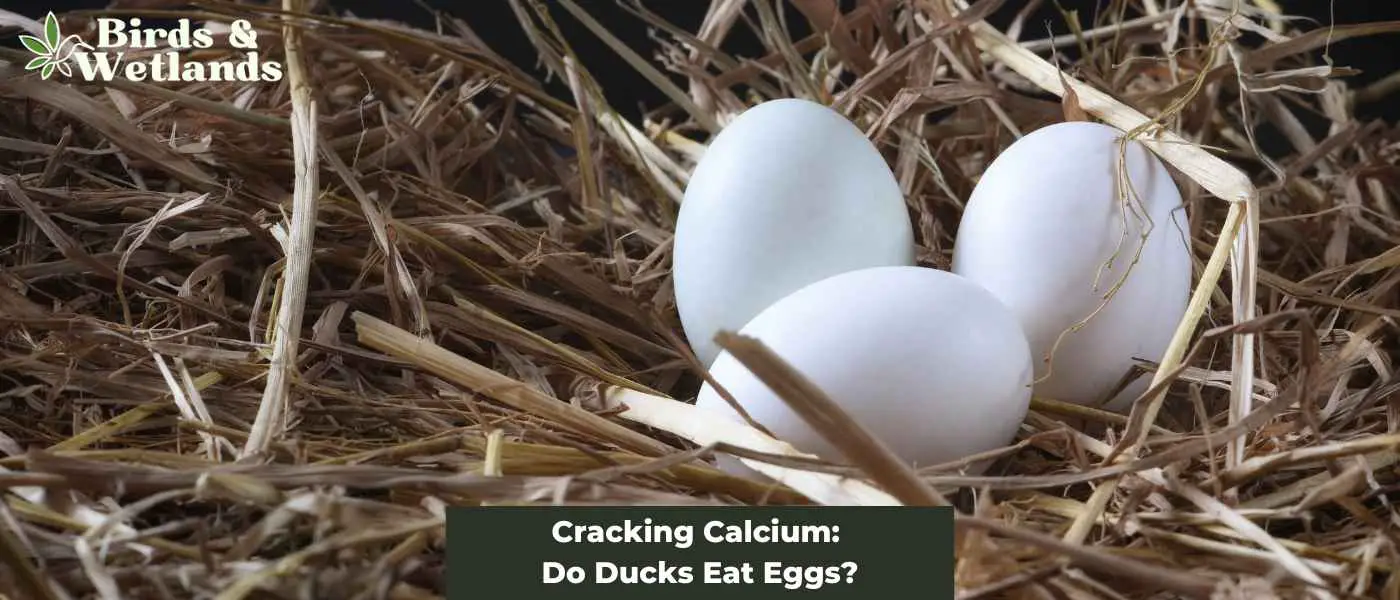Yes, ducks can and will eat eggs, especially if they are cracked or broken. Consuming eggs provides ducks with a rich source of protein and nutrients. However, if ducks develop a habit of eating their own eggs or those of other birds, it can be problematic.
To prevent this behavior, ensure that ducks have a balanced diet, collect eggs regularly, and provide a stress-free environment.
Key takeaways
Ducks can and will eat eggs, especially if they are cracked or broken, benefiting from the rich source of protein and nutrients they provide
However, if ducks develop a habit of eating their own eggs or those of other birds, it can lead to reduced egg production and potential nutrient deficiencies
To prevent egg-eating behavior, ensure that ducks have a balanced diet, including high-quality commercial duck feed, vegetables, grains, and occasional treats, to meet their nutritional needs
Collect eggs regularly and promptly to reduce the chances of ducks discovering and eating them
Provide a stress-free environment for your ducks by offering them ample space, clean housing, and proper nesting areas, as stress can trigger egg-eating behavior
If the issue persists, consider using dummy eggs or isolating the egg-eating duck to break the habit and protect the remaining eggs
Is It Safe for Ducks to Eat Eggs?
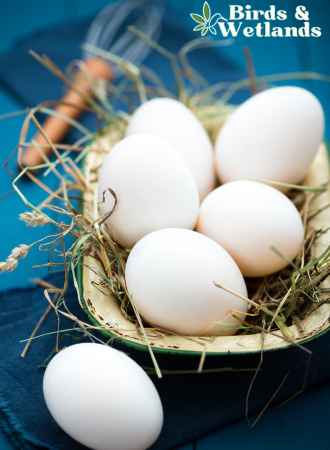
Ducks are known to eat a variety of foods, including insects, plants, and even small animals. But what about eggs? Can ducks eat eggs, and is it safe for them to do so?
Eggs are safe for ducks to eat. However, it is important to note that raw eggs can carry the risk of a salmonella infection. Therefore, it is recommended to feed ducks cooked eggs instead.
Cooked eggs can be a good source of protein for ducks, as they contain up to 26% protein. In fact, adding some eggshells to cooked eggs can enhance their nutritional value for ducks. Unlike raw eggs, prepared eggs do not have salmonella. An egg yolk contains vitamin D which is vital for calcium absorption.
Types of Eggs Ducks Eat
You can also feed eggs to domesticated ducks that are raised for egg production, but not uncooked eggs. They eat
Duck Eggs
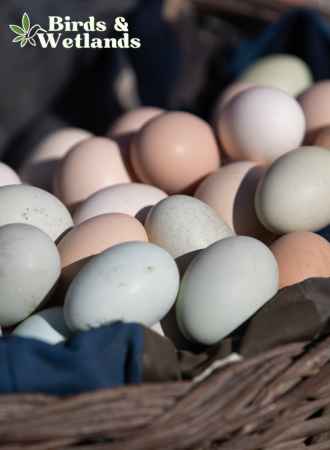
Ducks are known to eat their own eggs if they are cracked or broken. This can happen if ducks are not provided with enough nesting boxes or if they are disturbed while laying eggs. Eating their own eggs is a natural behavior for ducks and can be difficult to prevent.
They will also eat duck eggs from other ducks, you can feed them duck eggs but just ensure they are cooked and they do not eat raw egg if possible.
Chicken Eggs
Ducks eat chicken eggs if they are available. Chicken eggs are similar in size and shape to duck eggs, and ducks may mistake them for their own eggs. However, it is important to note that feeding ducks chicken eggs can lead to health problems, as chicken eggs do not contain the same nutrients as duck eggs so ensure the ducks diet is a balanced so they stay healthy.
Can Ducks eat egg shells?
Ducks can eat eggshells, which provide a good source of calcium, essential for strong bones and egg production. Before feeding eggshells to ducks, clean and dry them thoroughly to remove any residue, then crush or grind them into smaller pieces.
Feeding Ducks Eggs
Ducks can eat cooked eggs from any type of bird, including chicken, quail, and even duck. However, it’s important to cook the eggs before feeding them to the ducks. Cooking eggs can be done in any format, they can be scrambled eggs or boiled eggs or even fried eggs make a nutritious meal! This is because feeding raw eggs can contain harmful bacteria that can make the ducks sick.
Ducks eat eggshells, but they need to be crushed first. This is because the shells are hard and can be difficult for ducks to digest. Crushing the shells makes them easier to consume and helps the ducks get the calcium they need for strong bones and eggshells of their own.
While ducks can eat eggs, it’s important to limit the amount they consume. Eggs are high in protein, and too much protein can be harmful to ducks, especially young ones. It’s recommended that ducks get no more than 10% of their diet from eggs.
The Health Benefits of Feeding Eggs to Ducks
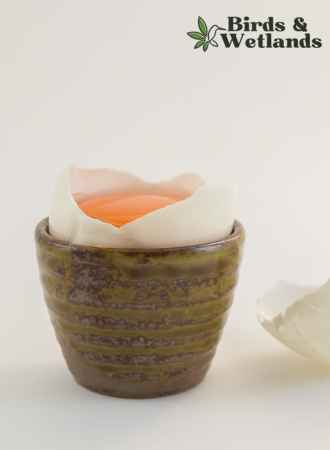
Here are a few reasons why feeding well cooked eggs to ducks can be beneficial:
High in Protein
Eggs are an excellent source of protein, and this is especially important for ducks during breeding season. Providing ducks with a protein-rich diet can help them produce strong and healthy eggs. Duck eggs, in particular, are especially rich in protein, with each egg containing around 11 grams of protein.
Rich in Vitamins and Minerals
Eggs are also a good source of vitamins and minerals that are important for duck health. For example, eggs are high in calcium, which is essential for strong bones and eggshell production. Eggs also contain vitamins A and D, which are important for immune function and overall health.
Biotin for Feather Health
Eggs are also a good source of biotin, a B-vitamin that is important for feather health. Biotin helps to promote strong and healthy feathers, which is important for ducks that spend a lot of time in the water. Feathers that are in good condition can help to keep ducks warm and dry, which is especially important during the winter months.
Moderation is Key
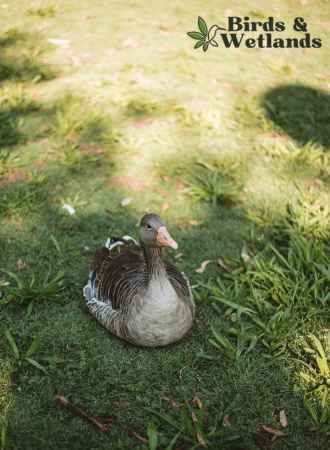
Egg eating for ducks can be beneficial, it’s important to do so in moderation. Eating eggs should be part of a balanced diet that includes other sources of protein, vitamins, and minerals. Too many eggs can lead to imbalances in the duck’s diet, which can lead to health problems and they should not eat raw eggs.

Black Larvae
High Nutritional Value: Rich in protein, calcium, and other essential nutrients.
Boosts Calcium Intake: With 50-75 times more calcium than mealworms

UCM Dried Mealworms
Nutrient-Dense: Packed with essential vitamins and minerals.
High Protein Content: With 53% protein,
FAQS on Can Ducks Eat Eggs
Can You Feed Ducklings Chicken Egg Yolk?
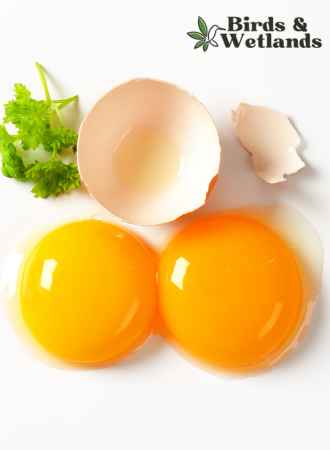
Yes, you can feed ducklings chicken egg yolk as a temporary source of nutrients, especially protein. Hard-boiled chicken egg yolks can be mashed and offered to ducklings in small amounts as a supplemental treat.
Are eggs safe for baby ducks?
Eggs can be safe for baby ducks as long as they are cooked and properly prepared. Start by introducing small amounts of eggs into their diet and monitor their reaction. As baby ducks have different nutritional needs than adult ducks, it is important to ensure they still receive a balanced diet with appropriate nutrients.
Can ducks eat too many eggs?
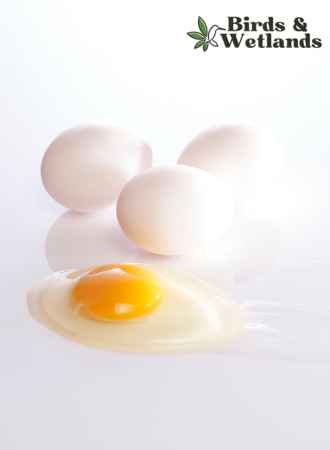
While eggs can be a nutritious meal for ducks, feeding them too many eggs may lead to an imbalance in their diet and potential health issues such as calcium deficiency. It is important to offer a variety of foods, including grains, seeds, and vegetables, to ensure they have a well-rounded diet.
How can I avoid feeding ducks too much calcium?
To avoid feeding ducks too much calcium, provide a balanced diet that includes a variety of food sources. While calcium is essential for a duck’s health, an excess can cause health problems. Monitor the amount of calcium-rich foods, such as eggs or oyster shells, that you provide and adjust as needed.
Best Duck Feed Pellets
Are you a duck owner looking for the perfect feed to keep your feathered friends happy and healthy? Look no further than Purina Duck Feed Pellets! With their nutritionally balanced formula and high-quality ingredients, these pellets are the ultimate solution for providing your ducks with the nutrition they need to thrive.
Pros
- Complete Nutrition: Purina Duck Feed Pellets are nutritionally balanced to provide all the essential vitamins and minerals that ducks need to stay healthy and strong.
- Easy to Digest: The pellets are specially formulated to be easy to digest, which makes them ideal for ducks of all ages.
- Promotes Growth and Development: With its balanced nutrition formula, Purina Duck Feed Pellets are designed to support healthy growth and development in ducks.
- Suitable for All Breeds: Whether you have domestic ducks or wild ducks, Purina Duck Feed Pellets are suitable for all breeds of ducks.
- Trusted Quality: Purina has been producing high-quality animal feed for over 100 years, so you can trust that your ducks are getting the best possible nutrition with Purina Duck Feed Pellets.
Cons
- Cost: Compared to other types of duck feed on the market, Purina Duck Feed Pellets can be slightly more expensive. However, many customers feel that the high-quality ingredients and balanced nutrition formula are worth the extra investment.
- Pellet Size: Some customers have noted that the pellet size of Purina Duck Feed Pellets can be quite large, which may not be suitable for smaller or younger ducks. However, many customers have reported that the pellets can easily be broken up or soaked in water to make them easier to eat.

